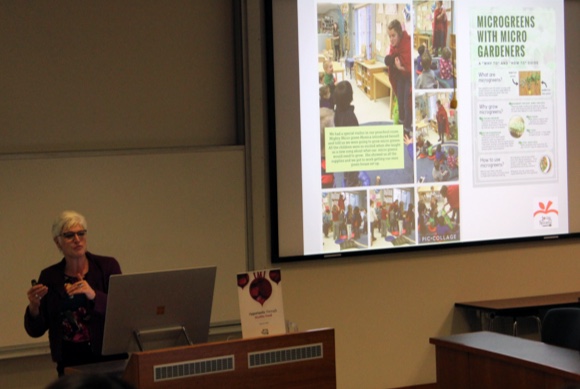Brown Bag Review: Food Security
February 25, 2019

Mara Shaw, Executive Director, Loving Spoonful
Food insecurity affects so many Canadians every single day, which, to some level, we all know. We know that, despite the fact that we live in one of the wealthiest countries in the world, that there is an awfully large chance that our next-door neighbor is starving. What few of us know, however, is that food insecurity goes far beyond that.
Do you know how to cook? Do your housemates know how to cook? When you say that you doknow how to cook, do you mean that you make a mean bowl of macaroni and hot dogs? On your college budget, would you ever pay for a bell pepper when you could get three boxes of Kraft Dinner for the same price?
When Mara Shaw, Executive Director of Loving Spoonful, visited Goodes Hall as part of the Centre for Social Impact’s Brown Bag Lunch Series, I initially thought that I was a lot more knowledgeable on the topic of food insecurity than I was. Of course, I wasn’t, and, of course, the complex issue is infinitely more complicated than I thought.
Loving Spoonful is a charitable organisation based in Kingston, tackling the problem of food insecurity from every angle imaginable. With a broad mission to connect people with healthy food, Loving Spoonful leaves their mark on the local community through programs that aim to educate elementary school students on healthy eating, simplify the process of cooking for individuals with developmental disabilities, provide fresh produce to the homeless population, and more.
Almost 2 million people in Canada over the age of 12 experience food insecurity, and this includes an estimated 18,000 people in Kingston who fall below the poverty line. While those numbers already seem baffling, the problem cuts deeper, as government bodies define food insecurity much differently than Ms. Shaw and organisations like UNICEF. It is not just about starving.
Food insecurity is about the fact that many of us are one missed paycheck, or one unexpected car repair away from not being able to afford three meals a day. It is about the fact that, even when we do have enough money to pay for processed junk, we may never have enough of our paycheck left over each month to pay for nutrient rich foods that our bodies need. Good food is a connector that so many of us are missing, and it can lead to detrimental consequences for our physical and mental health.
You might not be food insecure, but there is a good chance that the people close to you are impacted by this issue. It might be your housemate. It might be your friends back home. Or, maybe, you’re reading this and you’re realising it may actually be you as well. That’s a difficult thing to accept, but as with every social issue, things become a lot brighter when we all find the strength to acknowledge it.
As always, Ms. Shaw did not drop by just to cast a damper on the already slippery steps leading up to Goodes. In addition to providing information on the lovely programs run by Loving Spoonful in the community, she came with a wealth of solutions that, as young people and as business students, we should be doing our part to champion, and she came with information on many solutions already implemented.
It is always heartwarming to know that something is being done. So, you should know that something isbeing done. Kingston is home to a variety of non-judgemental foodbanks that are working to feed the community without the stigma. You may have heard of Martha’s Table, a wonderful gathering space on the corner of Princess & Nelson St in Kingston, Ontari. You should also know that, right here on the Queen’s University campus is a food bank run by the Alma Mater Society (AMS) located in the John Deutsch University Centre (JDUC). Of course, as hard as we try, the idea of standing in line for free food is enough to make many of us not reach out for the help that we need.
The real change has to come in legislation. It has to come from your votes, for the politicians who stand against food insecurity, and in every local election that doesn’t seem to matter very much – but makes all the difference.
In the short-term, food security can be tackled by shelters and by stands of fresh produce left outside by Loving Spoonful, but in the long-run it has to come in the form of a realbasic income pilot. It has to involve a tax on sugary processed foods (which found real results in New York, by the way). It has to involve a universal food program in schools – apparently, eating a sandwich out of a plastic bag on the gym floor is uniquely Canadian and equally insufficient.
There will be challenges. There will be failures (see: the basic income pilot that was absolutely obliterated by the new provincial government just a little while ago). But it is an uphill battle, and it is one worth fighting for if any part of you truly cares.
We greatly appreciate Mara Shaw for taking the time to share with us her thoughts and expertise on the topic of food insecurity. If you would like to learn more about the incredible work that she is doing with Loving Spoonful, and perhaps know of a way that you could help contribute, please visit their website at lovingspoonful.org.
Written by: Aysha Tabassum, BCom '22